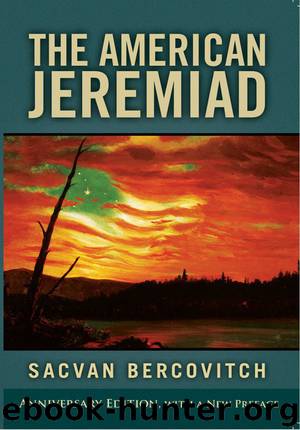The American Jeremiad (Studies in American Thought and Culture) by Bercovitch Sacvan

Author:Bercovitch, Sacvan
Language: eng
Format: epub
Publisher: The University of Wisconsin Press
Published: 2012-04-18T16:00:00+00:00
Here the pure Church, descending from her God,
Shall fix on earth her long and last abode;
Zion arise, in radiant splendors dress’d.
O Land supremely blest! to thee tis given
To taste the choicest joys of bounteous heaven;
Thy rising Glory shall expand its rays,
And lands and times unknown rehearse thine endless praise.
No dangerous tree with deadly fruit shall grow,
No tempting serpent to allure the soul
From native innocence. — A Canaan here,
Another Canaan shall excel the old,
And from a fairer Pisgah’s top be seen.26
The high optimism at mid-century — on the part of both the revivalists and the celebrants of Yankee America — reflected the material progress of the colonies. Despite a widening gap after 1730 between rich and poor, the poor were better off than their forebears had been. An extraordinary increase in population led to an extraordinary proportion of young people, many of them sanguine about their prospects for self-advancement. Not all of them succeeded, to be sure, but by 1740 the general living standard seems to have equaled or surpassed that of any European country. It may well be that this spectacular economic growth nourished ambitions that led into the French and Indian War. In any case, the war itself proved to be a triumph equally for English foreign policy, for the colonies’ burgeoning free-enterprise institutions, and for the rhetoric of the American jeremiad. Extending the old techniques to accommodate commercial, military, and territorial aims — clothing imperialism as holy war — the clergy summoned the colonists to an Anglo-Protestant errand into the Catholic wilderness. The French were “the offspring of that Scarlet Whore,” French Canada “the North American Babylon,” and the invasion itself a “grand decisive conflict between the Lamb and beast,” preview of Armageddon.* From the siege of Louisbourg (1745) to the Peace of Paris (1763), all of New England, as Nathan Hatch has shown, was gripped in “millennial optimism.” Hatch, noting the infusion of new concepts, claims that this “civil millennialism” marked a radical departure in colonial eschatology. His claim is no more valid, I believe, than that which has been made for Edwardsian post-millennialism; but he is surely right about the mood of the times. Liberals and Calvinists from Massachusetts to Virginia — including Edwards’s old antagonist Charles Chauncy — joined in predicting that the downfall of French Canada would bring “a most signal revolution in the civil and religious state of things in this world.” Even the elegant Mather Byles, Cotton Mather’s wry and sophisticated grandnephew, could not constrain his enthusiasm. “What a scene of Wonder opens to our View!” he exclaimed after the British victory of Louisbourg. “Good God! What an astonishing Scene of Wonders!” Other ministers were more fervent still in their enthusiasm. Their sermon titles give praise to God the Strength and Salvation of His people; the sermons themselves announce the fall of Babylon and (with the signing of the peace treaty) “the accomplishment of the scripture-prophecies relative to the Millennial State.”27
Significantly, Edwards adopted essentially the same view of the war. From his wilderness exile at Stockbridge he exulted in every hopeful scrap of news.
Download
This site does not store any files on its server. We only index and link to content provided by other sites. Please contact the content providers to delete copyright contents if any and email us, we'll remove relevant links or contents immediately.
| African | Asian |
| Australian & Oceanian | Canadian |
| Caribbean & Latin American | European |
| Jewish | Middle Eastern |
| Russian | United States |
4 3 2 1: A Novel by Paul Auster(12341)
The handmaid's tale by Margaret Atwood(7713)
Giovanni's Room by James Baldwin(7271)
Asking the Right Questions: A Guide to Critical Thinking by M. Neil Browne & Stuart M. Keeley(5722)
Big Magic: Creative Living Beyond Fear by Elizabeth Gilbert(5694)
Ego Is the Enemy by Ryan Holiday(5360)
The Body: A Guide for Occupants by Bill Bryson(5040)
On Writing A Memoir of the Craft by Stephen King(4895)
Ken Follett - World without end by Ken Follett(4691)
Adulting by Kelly Williams Brown(4540)
Bluets by Maggie Nelson(4522)
Eat That Frog! by Brian Tracy(4486)
Guilty Pleasures by Laurell K Hamilton(4398)
The Poetry of Pablo Neruda by Pablo Neruda(4072)
Alive: The Story of the Andes Survivors by Piers Paul Read(4003)
White Noise - A Novel by Don DeLillo(3983)
Fingerprints of the Gods by Graham Hancock(3968)
The Book of Joy by Dalai Lama(3951)
The Bookshop by Penelope Fitzgerald(3818)
